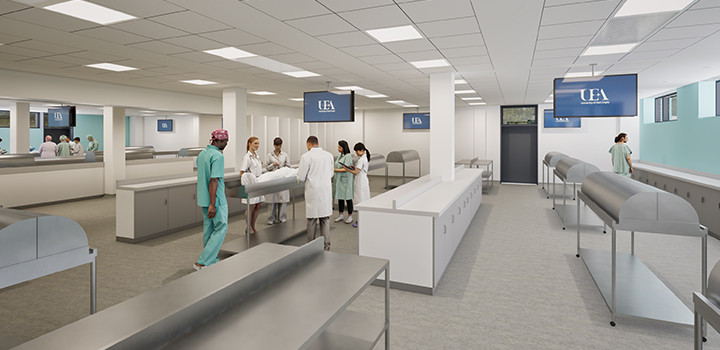UEA receives £1.5m Greater Norwich Growth Board funding boost for School of Oral Health
By: Communications

The University of East Anglia (UEA) moved a step closer to the delivery of a School of Oral Health for the region, after the Greater Norwich Growth Board (GNGB) unanimously recommended allocating £1.5m for a new facility.
Subject to a final stage of decision making, the money from Greater Norwich Growth’s Infrastructure Investment Fund will be used to construct an extension to the Edith Cavell Building on the site of Norfolk and Norwich University Hospital at Norwich Research Park. The board is made up of representatives from Norfolk, Norwich, South Norfolk and Broadland councils.
Works began earlier this year to deliver a ground floor extension to UEA’s new Anatomy Suite, with the GNGB funding enabling a first-floor extension, which will be home to the School of Oral Health.
The space will be equipped with dentist chairs, clinical grade fittings and other specialist teaching infrastructure such as phantom heads, teaching laboratory and seminar rooms. When completed, the school will provide capacity for 40 undergraduate students per year.
If undergraduate training starts in September 2026, the first cohort of dental students would qualify as dentists in June 2031, but they will be able to start delivering basic treatment within a few years.
Prof David Maguire, Vice Chancellor of the University of East Anglia, said: “This is great news and we thank the Greater Norwich Growth Board for its unanimous support. Providing dental training here in Norwich will be a positive move towards helping local people get the care they need.
“This is an important step in our bid to deliver undergraduate dental training at UEA, building on the success of the Norwich Medical School.”
UEA will be drawing on their significant experience of managing a successful medical school to retain graduates in the area. Currently, one third of UEA Medical School graduates work long term in the region post qualification.
This represents a significant step towards addressing the lack of NHS dentist capacity in Norfolk, and the funding announcement comes in the same week that Lord John Fuller, former leader of South Norfolk Council, urged the government to “look favourably” at UEA’s plans for a dental school.
Councillor Sue Holland, Leader of Broadland District Council and Chair of the Greater Norwich Growth Board said: “The lack of access to a dentist is a real concern for too many of our residents. There are long waiting lists and Norfolk is in the bottom 10% when it comes to the availability of NHS appointments.
“This will be the first dental school opened in the UK since 2005 and it will have an immediate impact. Training dentists locally will provide much needed resources for existing dental practices.”
Councillor Kay Mason Billig, Leader of Norfolk County Council, said: “We need to ensure everyone has access to dental care. This is an important part of our strategy for Norfolk, aiming to attract and retain the right skills in key areas. The East of England is chronically under served, with our nearest undergraduate dental courses in Birmingham and London.
"Norfolk County Council has been working hard to support UEA’s ambitions for a new School of Oral Health, which is why we brought this proposal to the Greater Norwich Growth Board. We are delighted, therefore, that this investment now has the support of district partners."
Planning for the future growth of the School of Oral Health is already underway with the majority of cost for the further expansion being covered by revenue received by UEA through course income.
Future works enable an expansion of facilities both within and beyond the Edith Cavell Building to accommodate a larger number of students, increasing from 40 to 65 students per year.
For more information visit the Greater Norwich Growth Board website: www.greaternorwichgrowth.gov.uk.
Related Articles

Work underway on UEA’s new high-tech anatomy centre
Works have commenced on UEA's new Anatomy Suite. The facility is planned to be completed during 2025, supporting the recruitment and retention of highly skilled health care professionals, both regionally and nationally.
Read more
UEA launches study after supplement shows promise in professional racing drivers
Researchers at the University of East Anglia (UEA) are launching a new study to see whether American ginseng extract could boost brain health.
Read more
UEA to receive share of £15 million funding boost for region
University of East Anglia researchers have been awarded a share of £15.3 million to tackle real-world health and care challenges across the region and beyond.
Read more